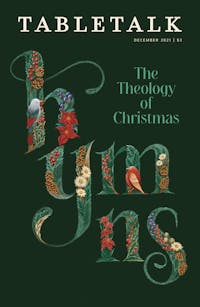
Request your free, three-month trial to Tabletalk magazine. You’ll receive the print issue monthly and gain immediate digital access to decades of archives. This trial is risk-free. No credit card required.
Try Tabletalk NowAlready receive Tabletalk magazine every month?
Verify your email address to gain unlimited access.
Charles Wesley’s hymns (about 6,500 in number) are rich in doctrine and scriptural allusion, and his texts are direct in confronting the condition of men’s souls. When singing a Wesley hymn, one almost inevitably sings the gospel.
In the final stanza of “Hark! the Herald Angels Sing,” Wesley successfully condenses several great themes of Christology and soteriology and articulates the significance of these themes for the life of the believer. He gives us a simple yet stirring creed that we recite in the span of a few breaths. Not satisfied with glibly stating doctrinal propositions, Wesley always links doctrine to Christian experience. Here he rightly connects Jesus’ incarnation and resurrection to the Christian’s experience of these realities in the new birth and the coming resurrection of the dead. Christ “lays his glory by” and takes on flesh that we might not have to die the second death. He is born that we might be born again, and He rises from the dead that we might be raised to eternal life.
As people who are born again, Christians have already in a sense experienced a resurrection. We who were spiritually dead have been regenerated—raised to new life in Christ. In an unconverted state, we have no interest in spiritual things—we have no eyes to see, no ears to hear, and no heart to understand spiritual matters. Yet, when God’s Spirit calls us to life, we are awakened to the truth of the gospel. Our reborn souls perceive the things of God in a new light: our eyes are open to the glory of God, our ears hear our Master’s voice, and we delight in knowing Him.
First Peter 1:3, 5 tells us that God “has caused us to be born again to a living hope through the resurrection of Jesus Christ from the dead” and that He is guarding us “for a salvation ready to be revealed in the last time.” Wesley brilliantly amalgamates these two ideas of birth and resurrection. This “second birth” is a foretaste of the resurrection that we will one day experience at the resurrection of the dead when Christ returns.
The fact that this eschatological (final) resurrection is a physical, bodily resurrection is undeniable. Scripture speaks of those “in the dust of the earth” and in “the sea” awakening at the resurrection (Dan. 12:2; Rev. 20), some to eternal life and some to eternal judgment. First Corinthians 15 tells us that Christ’s bodily resurrection from the dead is the firstfruits of our own resurrection. His resurrection guarantees and sets the pattern for the bodily resurrection of those united to Him. These resurrection bodies will be recognizably like the ones we have now, but glorious, incorruptible, and suited for heaven, just like Christ’s body after His resurrection. When the trumpet sounds, the dead will be raised imperishable, and the bodies of the living will put on immortality. This will all happen “in a moment, in the twinkling of an eye” (vv. 51–53). Philippians 3:20–21 says that “we await a Savior, the Lord Jesus Christ, who will transform our lowly body to be like his glorious body, by the power that enables him even to subject all things to himself.”

The resurrection of the body is affirmed in the creeds of the church and echoed in countless hymns. The Apostle Paul assures us that our hope is not only in this present life. The expectation of resurrection is the singular basis of hope for the Christian. This hope shaped the lives and ministries of the prophets, Apostles, and martyrs, and it is the final redemption for which we long.
Our heaven-born Prince of Peace, our Sun of Righteousness who brings us light and life, who was born that we might never die but that we might be born again to a living hope, whose resurrection ensures our own—He is the One of whom we sing this Christmas and for eternity. The grave cannot halt our procession of worship. We will process more nobly, sing more beautifully, and adore more lovingly when, free from sin and death, we behold our Savior and join the angelic host to proclaim the glory of our King.
